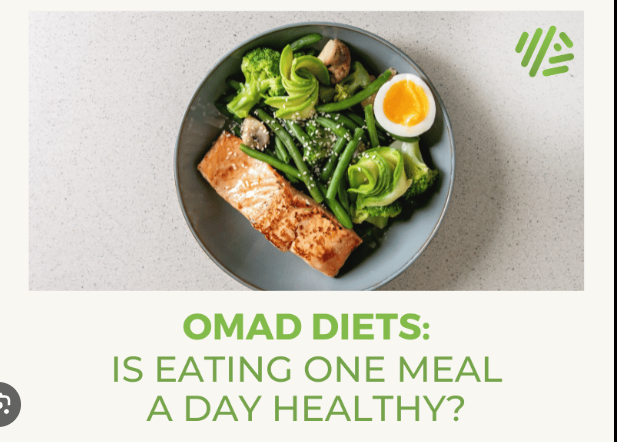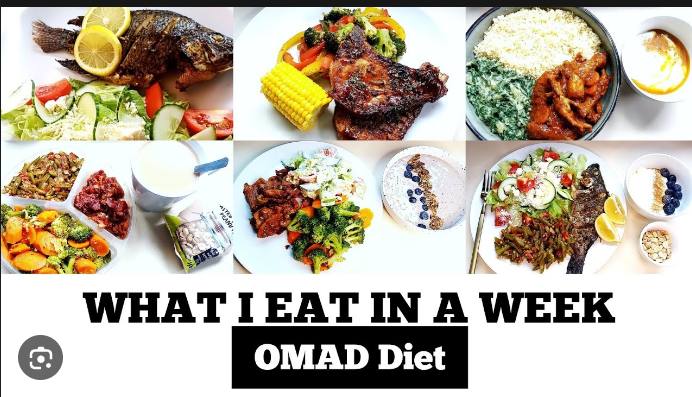If you’re thinking about starting the one meal a day OMAD diet, you might want to read what experts have to say about its advantages, disadvantages, safety, and effectiveness in helping people lose weight first.
Regretfully, people are still fascinated by celebrity diets. The one meal a day, or OMAD, diet is the newest and most popular weight-loss fad. Additionally, it’s become quite popular on TikTok, where the hashtag #omad has received over 500 million views. Videos of “omaders” show off their impressive weight loss achieved on the diet and show off their one meal, which is frequently an enormous quantity of food—2,000 calories or more—for a single meal.
More than 300 books about the diet are available on Amazon, many of which were released in 2023. There are now OMAD meal delivery subscriptions available that provide frozen meals to assist in breaking your fast.
Also read-Holiday Drinks : Fun Ways To Burn Off Holiday Drinks For Healthy Body

Although this diet has gained popularity recently, it has been around for more than a decade. It gained popularity in Silicon Valley as a method of “biohacking” to boost output.
What is the OMAD diet?
OMAD is an extremely strict type of intermittent fasting that is comparable to the warrior diet but much stricter. As the name suggests, there is only one large meal per day, followed by a 23-hour fast. Its proponents assert that it is a rapid and efficient method of weight loss.

Is eating one meal a day healthy? Benefits and risks
All the social media testimonials might tempt you to try the OMAD diet, but the benefits are questionable.
“At best, it can serve as a jump-start to weight loss because it doesn’t require much thought and is relatively simple to follow,” says Lisa Drayer, a New York City-based registered dietitian. “But like other intermittent fasting programs, the OMAD diet has its limitations.”

Primarily, Drayer explains, eating one meal and fasting the rest of the day is not sustainable.
“Developing long-term healthy eating habits without severe restriction is the key to successful weight maintenance.”
Does the OMAD diet work?
Although the majority of the studies have been small and have been conducted for a brief period of time, some research suggests intermittent fasting is generally effective. The OMAD diet appears to have only been the subject of three studies, two of which are pretty concerning.

According to a recent European study that was published in Frontiers in Physiology, eating one evening meal a day reduced weight and fat mass more than consuming the same number of calories over the course of three meals a day (breakfast, lunch, and dinner).
But this was a very small randomized crossover study with only 11 healthy, lean adults who followed the OMAD diet for 11 days.
Is the OMAD diet safe?
So, is OMAD unhealthy if it can aid in weight loss? Perhaps. The diet may cause more harm than good and is not appropriate for everyone. For example, anyone taking medication for high blood pressure or heart disease, or those with diabetes, may find it unhealthy to fast for twenty-three hours. This kind of intense intermittent fasting should also be avoided by kids, women who are pregnant or nursing, and those who have a history of eating disorders.

Here are the groups that researchers say should not try the OMAD diet:
- women who are expecting or nursing.
- Youngsters and adolescents.
- older people.
- individuals with a background in eating disorders.
- Adults who are underweight (body mass index, or BMI, <18.5).
- Change employees. According to studies, shift workers may find it difficult to stick to a fasting schedule, particularly when working overnight.
- Individuals who have health issues or who require food and medication at particular times.
OMAD Diet Benefits
The OMAD diet may have some benefits, including:
- Simplicity.
- Weight loss potential.
- Suggested longevity benefits.

OMAD diet risks
Following the OMAD diet may carry some risks:
- Nutrient deficiencies.
- Feelings of failure
- Socially isolating.
- Negative health implications.

Alternatives to the OMAD diet
While intermittent fasting may help some people lose weight, the OMAD diet is the most severe kind and comes with a number of risks.

Varady asserts that a shorter fasting period can provide the same advantages in a safer manner.
Varady et al., for example, studied eating patterns with time restrictions of four and six hours (e.g., eating from 3 to 7 p.m. or from 1 to 7 p.m.). In contrast to the 23 hours on the OMAD diet, that is 20 or 18 hours of fasting.
Also read-Eating Less Meat : Eating Less Meat Would Be Good For The Earth, Small Nudges Can Change Behavior
images source: Google
Disclaimer: The opinions and suggestions expressed in this article are solely those of the individual analysts. These are not the opinions of HNN. For more, please consult with your doctor.




































